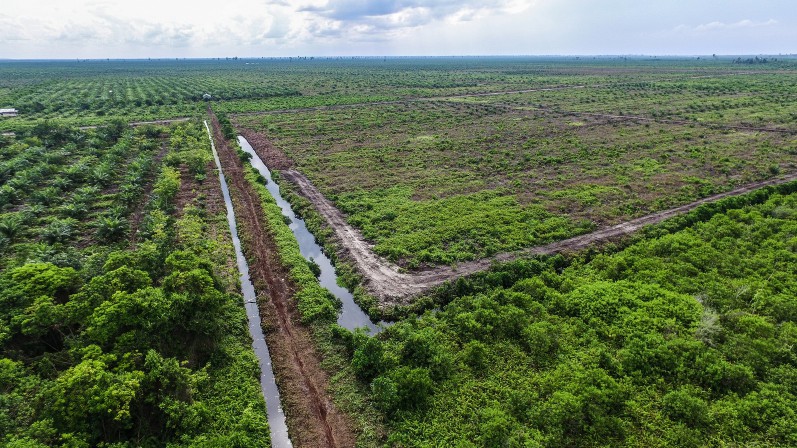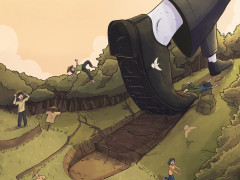Does Indonesia Still Deserve to be Called an Agricultural Country?
By Abil Salsabila dan Yoga AprilliannoVillage Regulations Can Prevent Forest Fires
About the author: Zamzami is a Pantau Gambut contributor from Riau.
Large fires during the 2014–2015 dry season were exacerbated by an El Niño which caused trauma to residents of two villages in the Bandar Laksamana and Bukit Batu subdistricts of Bengkalis, Riau. Api-Api and Batang Duku are only two of the dozens of villages on the north coast of Riau where peatlands burned.
Almost every day the residents of both villages were forced to breathe in toxic fumes from the haze. Public health was sacrificed, especially for the elderly, pregnant women, and children. On top of that, the fires destroyed socioeconomic activity and had devastating ecological effects, especially in the Giam Siak Kecil Wildlife Reserve, which is mainly peatland. Wanting to avoid similar disasters in the future, the community learned about the characteristics of damaged, dried, or burnt peat.
Managing peatlands and forests effectively does require extensive knowledge. In addition to forest fires during the dry season, local communities have also faced flooding during the rainy season. These floods are caused by the excavation of peat canals by plantation owners and commercial forestry companies, such as Industrial Plantation Forest (HTI) permit holders.
"To date, most peatlands and their water are controlled by corporations. The regulation of peatland water when it’s dry or rainy is the exclusive prerogative of companies. Companies and local residents do not coordinate regarding opening and closing the canal door. As a result, community members are left to become victims when fires and floods occur," Usman Affandi Batubara (Fandi), Communications Coordinator at the NGO Kaliptra, said on 8 August 2018.
The lack of effort from corporations has pushed villagers to band together to address these issues themselves. Joined by Kaliptra and the Riau Forest Rescue Network, residents discussed the formulation of village regulations at the home of the local village head on 11 September 2017. The next day, the discussions continued in a more official forum at the village hall, attended by a diverse range of community members. Residents recognized that their village was very vulnerable to forest fires in the dry season and flooding in the rainy season. It was also revealed that the peat canal estuary made by the sea by a company was filled with the same company’s wood waste.
Less than a week later, the results of the discussion were published as Village Regulation No. 7/2017 on Water Management, Forest and Land Fire Control, and the Utilization and Protection of Natural Resources. Interestingly, Article 9 of Chapter VII regulates sanctions against individuals whose activities disrupt peat water systems and fail to protect natural resources, causing fire and ecological damage. The regulation states that any individual found in violation will be subject to a IDR 20 million fine. Additional compensation for incurred losses is to be determined amicably between parties.
"The regulation also mentions criminal sanctions in accordance with [national] law. Meanwhile, for companies, sanctions are much heavier. Companies are subject to a fine of IDR 500 million plus the value of incurred losses. The village government can even propose that the central government or its permitting agencies revoke companies’ operation permits if they violate the regulation," said Fandi.
Similar village regulations were also issued by the government of neighboring Batang Duku Village. Batang Duku Village Chief Syafri said that in 2014 and 2015, the peatland fires in his village were quite large. However, once they discovered that the fires were caused by peat drainage, the community made considerable progress toward fire prevention.
"In 2014 and 2015, there were forest fires in our village. But, thank God, in 2017 there were no forest fires, once we built the canal block and water reservoir. In the beginning of the year a fire started, but the reservoir promptly stopped it from expanding," said Syafri on 13 August 2018.
Unfortunately, although companies in the area play a key role, the socialization of village regulations is limited to village residents. While village agricultural activities cause some peat drainage, company activities do so on a much larger scale.
"It's hard to communicate with them [corporate permit holders]. Because they close themselves off. Only now, we can prevent fires. We have already socialized community members who garden and farm," Syafri explained.
In addition to issuing a village regulation, residents of Batang Duku have built at least six reservoirs and seven canal blocks this year. According to Syafri, the regulations and the construction of reservoirs and canal blocks were enough to prevent forest fires in their area. Api-Api and Batang Duku should be an example for other villages to immediately issue village regulations on sustainable peatland management.




